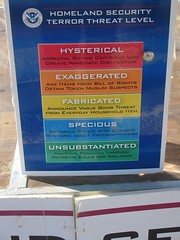0.
| Sometime around December 2003, a German citizen was kidnapped while travelling to Macedonia. Only when he was released, around May 2004, He claimed that it was the CIA who had taken him into custody. Khaled el-Masri sought justice and filed a lawsuit, with the assistance of the ACLU, against the CIA. |
1.
After hearing his claims, the court rejected el-Masri’s lawsuit; not due to lack of cause or lack of proof, but due to one simple reason: The US Government had petitioned to classify evidence, and therefore to dismiss the claim due to the State Secrets Privilege. el-Masri appealed to the state’s supreme court (el-Masri v. Tenet, 06-1667), where his claim was rejected, and then to the US supreme court. Yesterday, the US Supreme Court had denied certiorari.
2.
I find it hard to understand the need to use the State Secret Doctrine, as it states one thing only: that there is something with el-Masri’s statements. Let’s assume, for a second, that el-Masri is mistaken, he was not abducted or kidnapped by US authorities and he was not tortured. Could he prove otherwise in court? He will go on the stand and testify what he saw, state where he was taken and give his best explanation as to his whereabouts during these 160 days. However, he will have to call George Tenet to the stand and any other CIA official he will recognise; They will go on the stand and answer his questions, which will probably be something like: (i) Did you kidnap el-Masri (no) (ii) Did you cause him grave danger? (no) (iii) Was he taken to a secret facility (no).
After not being able to prove his claim, the court will deny damages.
3.
While this might have been the right way to settle this lawsuit (or even settling outside the court, as done in US v. Reynolds 345 U.S. 1 (1953) eventually. (after the confidential information in Reynolds was declassified, it was found out to contain only information about the poor status of the B-29, and no confidential information that could engrave the national security or aviation security), the US decided to motion to dismiss any kind of claim, where it had no intention of paying el-Masri or admitting their mistake.
4.
The State Secret Doctrine is applied differently in Israel; Partially since Israeli does not consider constitutional torts as cause of action (MCR 2874/06 Abu-Smara v. State, Daphna Barak-Ererz, Constitutional Torts (1994)). The other instance is that in Israel the State Secret Doctrine works in favour of criminal plaintiffs and not in favour of the government (for claims against the government, we usually apply the Wartime Action Doctrine (Civil Torts Law (State’s Liability) Act, C 17071/01 Fisher v. State)
5.
However, in one case where the Israeli Supreme court had to face the question of the State Secrets Docrtine (MCR 6763/06 Doe v. Aviation Authority, the question was whether to disclose issues which might endanger national security in order to a warrant issued by the Minister of Defense. The court explained that there is a major difference between a warrant in a criminal case against a defendant (where charges against the defendant are withdrawn) and a civil one, where a compelling interest might be tempered. The Hon. Judge Eliakim Rubinstein stated that though the state had a compelling interest in preserving national security, justice has to be done and revoked the warrant, where the judge was able to inspect, in camera, the classified documents.
6.
Security agencies, like U2 and God, work in mysterious ways. Their incentive to lie (as in the Reynolds case) or cover up (like in Tali Fahima‘s case) are sufficient to stop trusting the government. We know our governments cover up their mistakes, that’s why we are taking our initiative and keep fucking with them.
7.
 On the other hand, maybe John Perry Barlow was right in one thing. Barlow explained yesterday (voice recording in English) that the US opposes China since it sees in China all that it hates in itself. China is at least as undemocratic as the United States, and not criticising the US for its actions, or actually allowing George Bush to criticise China whilst doing the same thing, is more than hypocrisy, it’s being stupid and blind to your own government’s actions.
On the other hand, maybe John Perry Barlow was right in one thing. Barlow explained yesterday (voice recording in English) that the US opposes China since it sees in China all that it hates in itself. China is at least as undemocratic as the United States, and not criticising the US for its actions, or actually allowing George Bush to criticise China whilst doing the same thing, is more than hypocrisy, it’s being stupid and blind to your own government’s actions.
What will be when we decide to start thinking in equal terms to our conduct and others? Can we judge ourselves in the same standards we wish to judge others or are we setting a rainbow of standards, where we can act on one way since we feel democratic and liberated, and others can’t?
—
Img cc-by-sa Genome4hire